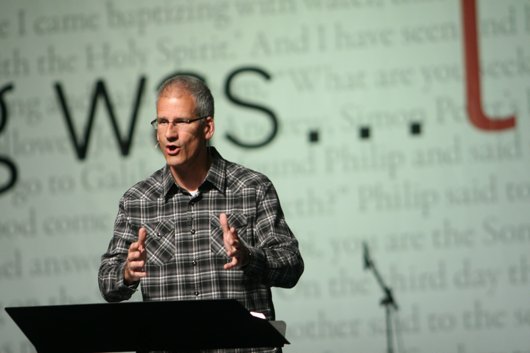
During worship this weekend, consider Bob Kauflin's message "3 Ways Singing Serves the Word". You can listen to the whole thing or read the notes.
1) Singing can help us remember words.
Ever notice how easy it is to recall the words of songs you haven't heard for 20 years? We store literally hundreds, even thousands of songs in our memory vaults. Music has an unusual mnemonic power.
We remember patterns in music much better than patterns in words alone. Rhyme, meter and song are the most powerful mnemonic devices. They govern and restrict the way we say words and the time it takes to say them.
Implications
- In the church we should use effective melodies, that is, melodies that people are able to remember and that they want to remember.
- We should sing words God wants us to remember. Ask yourself, If the teaching of our church was limited to the songs we sing, what would our people know?
- We should seek to memorize songs. Don't be too dependent upon screens or hymnbooks.
2) Singing can help us engage the words emotionally.
Music is a language of emotion in every culture of every age. It is capable of effecting us in profound and subtle ways (like when Saul's spirit was calmed by David's harp).
Implications:
- We need a broad emotional range in the songs we sing: reverence, awe, repentance, grief, joy, celebration, etc.
- We don't need to pit different styles or traditions against one another. They each serve to help us in different ways.
- Know that there is a difference between being emotional moved and spiritually enlightened. Music has a voice but we're not always sure what that voice is saying. It can make us feel peaceful, but it can't tell us that the Lord is our shepherd or that Jesus endured God's wrath in our place to bring us eternal peace with God.
- Singing should be an emotional event. And they should be religious affections. God is worthy of our highest, purest, and strongest emotions. Singing helps express and unite them. Singing without emotion is an oxymoron.
3) Singing can help us use words to demonstrate and express our unity.
The first two points can be accomplished when we sing by ourselves, but this point needs other people.
People sing together in the strangest places: rock concerts, sporting events, birthdays, weddings, funerals. Singing together tends to bind us together. It enables us to spend extended periods of times expressing the same thoughts and passions.
Implications
- We should sing songs that unite rather than divide the church. We can appreciate the diverse musical styles and genres, but we shouldn't try and make church worship "something for everybody." There should be a unifying musical center that focuses on the sound of the people themselves.
- Musical creativity in the church has functional limits. Your iPod shouldn't be the starting point for selecting songs to sing together. We want to pursue a creativity that is undistracting and not just innovative.
- We must be clear that it is the gospel and not music that unites us. We shouldn't connect with people at our churches because they have the same song selection on their iPods. We should love them because Christ has enabled us to love them.
- Ask yourself, What are we doing to encourage our church in corporate singing? In the new heavens and earth we will sing gloriously and for a long time. Our thoughts and passions will be focused, and we will have the strength to give him the glory he deserves. What a glorious thing to anticipate that time! And part of our singing here on earth is anticipation of what is to come.
No comments:
Post a Comment